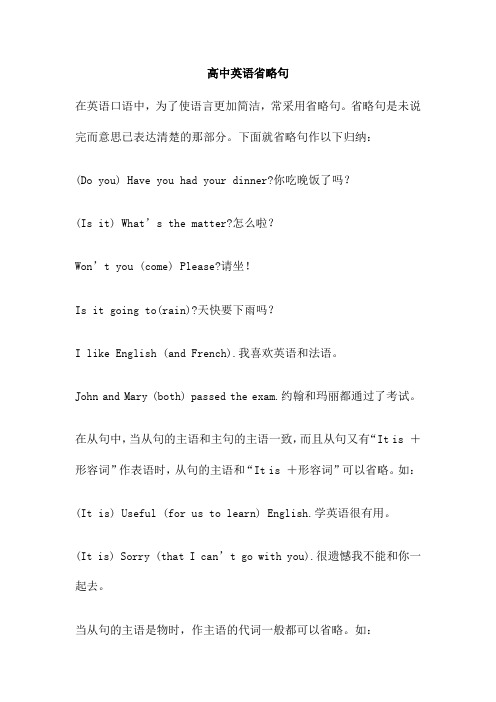高三英语省略句
- 格式:ppt
- 大小:242.50 KB
- 文档页数:13

高中英语省略句在英语口语中,为了使语言更加简洁,常采用省略句。
省略句是未说完而意思已表达清楚的那部分。
下面就省略句作以下归纳:(Do you) Have you had your dinner?你吃晚饭了吗?(Is it) What’s the matter?怎么啦?Won’t you (come) Please?请坐!Is it going to(rain)?天快要下雨吗?I like English (and French).我喜欢英语和法语。
John and Mary (both) passed the exam.约翰和玛丽都通过了考试。
在从句中,当从句的主语和主句的主语一致,而且从句又有“It is +形容词”作表语时,从句的主语和“It is +形容词”可以省略。
如:(It is) Useful (for us to learn) English.学英语很有用。
(It is) Sorry (that I can’t go with you).很遗憾我不能和你一起去。
当从句的主语是物时,作主语的代词一般都可以省略。
如:The book (that I read yesterday) is very interesting.我昨天读的那本书很有趣。
在定语从句中,当先行词在定语从句中作状语时,关系代词可以省略。
如:The way (that/which) we use is more convenient.我们使用的方法更简便。
The reason (why) he was late is that he had to help the old lady across the street.他迟到的原因是他得帮助那位老太太过马路。
在一些表示建议、请求、命令等含义的动词后的宾语从句中,谓语动词常省略。
如:I suggest (that) we (should) discuss the matter.我建议我们讨论这个问题。




省略句为了使话说得简明扼要,英语句子中某个单词、短语甚至从句或主句都可以省去。
这种省去句子某些成分而保持句子意思不变的现象,称为省略(ellipsis)Ⅰ、状语从句中的省略用法一、如果从句的主语和主句的主语一致,且从句的谓语含有be动词的某种形式(am/is/are/was/were),可同时省略从句的主语和be动词的某种形式。
1、when,while引导的时间状语从句e.g. Do be careful when (you are) crossing the street.When/While (I was) on my way to work, I met her.2、if,unless,once引导的条件状语从句e.g. If (it is) properly treated, waste will do no harm to the environment.I’ll not go to the party unless (I am) invited.Once (you are) caught stealing in a supermarket, you will be punished.3、though,although,whether,no matter whether/what/how/who等引导的让步状语从句e.g. He was happy, though/although (he was) poor.Whether (she is) sick or well, she is always cheerful.No matter how/However hard the task (is), we must fulfill it in time.(注:从句的主语和主句的主语不一致时,只省略从句中的be动词形式)4、as if,as though引导的方式状语从句e.g. He rubbed his eyes and yawned as if/though (he was) waking up after along sleep.He stood up as if/though (he wanted) to leave.(as if/though + to do表示一个将来的动作)二、than,as引导的比较状语从句中的省略用法:当不同的主语进行比较时,一般省略从句中的谓语;当从句中的主语与谓语(be动词除外)和主句中的主语与谓语相同时,通常省略从句中的主语和谓语,只保留比较部分。

完整版英语省略句的六大总结
1.主语省略:当主语已经被上下文所明确时,可以省略主语。
例句:(原句)I am going to the bookstore.
(省略) Going to the bookstore.
2.谓语动词省略:当谓语动词已经被上下文所明确时,可以省略谓语动词。
例句:(原句)She can play tennis very well.
(省略) She can play very well.
3.宾语省略:当上下文中已明确了宾语时,可以省略宾语。
例句:(原句) Would you like to have some watermelon?
(省略) Would you like some?
4.介词省略:当介词与其宾语紧密相连,且已明确时,可以省略介词。
例句:(原句) We are waiting for you in the park.
(省略) We are waiting for you the park.
5.主语从句省略:当主语从句中的主语与句子的主语相同,可
以省略主语从句。
例句:(原句) That he could swim surprised me.
(省略) To swim surprised me.
6.定语从句省略:当定语从句中的关系代词为主语时,可以省略关系代词。
例句:(原句) The book that I borrowed from the library is very interesting.
(省略) The book I borrowed from the library is very interesting.。
省略句为了使讲话和行文简洁,句中某些成分有时可省略。
省略可分以下几种情况:(一)简单句中的省略1、省略主语:祈使句中主语通常省略。
其它省略主语多限于少数现成的说法。
e.g. (I) Thank you for your help.(括号内为省略的词语,下同)(I) See you tomorrow.(It) Doesn’t matter.2、省略主谓语或主谓语的一部分。
e.g. (There is) No smoking.(Is there) Anything wrong?Why (do you) not say hello to him?3、省略作宾语的不定式短语,只保留to。
e.g. ---- Are you going there?---- I’d like to (go there).He did not give me the chance, though he had promised to (give me the chance).(动词:want, wish, expect, hope, like, love, try, forget, decide,prefer, mean, intend, plan, refuse…等动词宾语。
tell, ask, want, expect, warn…等动词的宾补。
形容词:glad, happy, pleased, delighted, …短语:be going to, be about to, be able to, have to, u sed to, ought to, …)注意:如果该宾语是be动词或完成时态,则须在to之后加上be或have。
e.g. ---- Are you an engineer?---- No, but I want to be.---- He hasn’t finished the task yet.---- Well, he ought to have.4、省略表语。